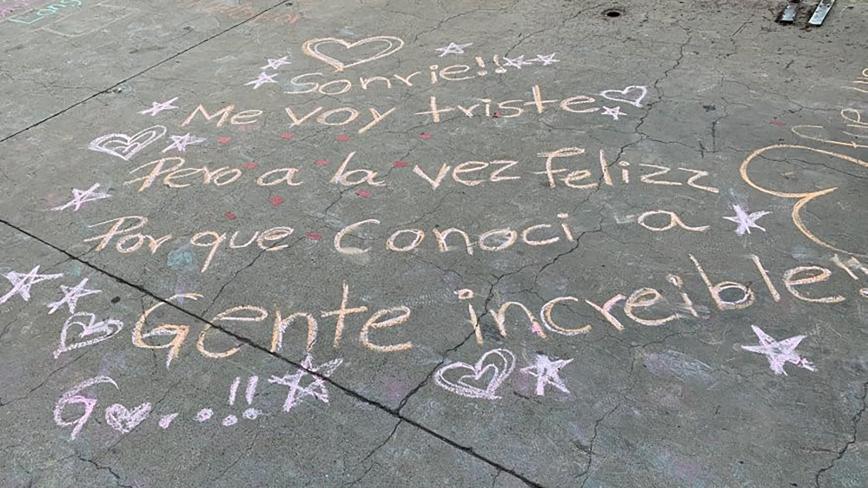An unprecedented number of unaccompanied children and an historic pandemic, COVID-19, converged in a humanitarian crisis on the southern border of the United States in the spring of 2021. Pandemic restrictions had severely limited shelter capacity, and record numbers of children strained the capacity of the U.S. Department of Health & Human Services and the U.S. Department of Homeland Security to provide for medical needs address reunification.
So, federal, state, and local governmental agencies created temporary Emergency Intake Sites at convention centers in San Diego and Long Beach.
Within 24 hours, University of California academic health centers mobilized pediatric and urgent care facilities and staff to provide comprehensive medical services at the sites as well as culturally sensitive psychological, social and dietary support.
A detailed study of the well-organized collaborative response from all of UC’s academic health centers has been published in Academic Medicine, the journal of the Association of American Medical Colleges. “Academic Health Centers and Humanitarian Crises: One Health System’s Response to Unaccompanied Children at the Border” outlines how such efforts from an academic health system can complement the capacity of local, state and federal agencies to respond to large-scale emergencies. The study’s authors were UC faculty and staff expert in pediatrics, family medicine, nursing, emergency management and medical information technology from UC academic health centers and the UC Office of the President, as well as partners from children’s hospitals in southern California.
“UC is committed to addressing the health needs of those who are most vulnerable in California,” says Carrie L. Byington, M.D., executive vice president of University of California Health. “In addition to providing trauma-informed care, our teams created processes and electronic health records to help each child transition into the care of a family member or guardian and medical providers in their community. It was important for us to document what we learned and what succeeded, so that we and other institutions and organizations can provide a robust response to crises in future.”
Cross-system and cross-functional collaboration
The systemwide, rapid response brought multi-disciplinary teams of UC child health professionals from UC’s six academic health centers – UC San Diego Health, UCLA Health, UCI Health, UCR Health, UCSF Health and UC Davis Health – to two major intake sites in the state along with laboratory and radiological equipment.
Over five months, teams made up of 260 physicians, 42 residents and fellows, and four nurse practitioners in addition to hundreds of staff provided state-of-the-art preventative and interventional care for nearly 5,000 children and adolescents. Professionals working onsite included general pediatricians and specialists in preventive medicine, emergency medicine, family medicine, child psychiatry, dentistry, ophthalmology, orthopedics, gynecology, obstetrics, nursing, and social work. Partners from UCLA Mattel Children’s Hospital, Children’s Health of Orange County (CHOC) and Rady Children’s Hospital also joined the effort.
The care teams were supported by additional UC professionals and resources to ensure availability of electronic medical records; medical supplies; pharmaceuticals and vaccines. Thoughtful details such as cheerful murals created by UCLA Health Marketing made the visually nondescript convention center spaces feel welcoming and less temporary.
All children received triage visits on arrival and full exams within 24 to 48 hours. Approximately 16 percent of children had COVID-19, most infected prior to arrival, and infection prevention processes helped limit forward transmission within the emergency sites or in the community.
UC providers were available 24/7 onsite and delivered an additional 11,000 urgent care visits and nearly 8,800 doses of vaccines. Children at the centers also received services through onsite pharmacies, a radiology suite and a laboratory for processing critical testing created by the response teams.
Child life professionals were involved to provide access to exercise, play, and entertainment to create a safe and developmentally appropriate environment to support both the physical and mental health of migrant children during this traumatic time.
Learning from the past and training for the future
UC academic health centers have experience with international humanitarian missions and large-scale community health services, from pop-up COVID-19 testing and vaccination clinics to medical care for the Los Angeles Marathon and Special Olympics World Summer Games, to support in crises such as the massive 2010 earthquake in Haiti and deadly explosions in Lebanon in 2020.
Efforts at the San Diego and Long Beach Emergency Intake Sites brought UC’s health system the opportunity to test its emergency capacity and fostered unity through shared values and a mission to protect and care for vulnerable children. Equally important was the ability to provide experiential training for postgraduate trainees, supported by an online course developed for this response that provided foundational knowledge on topics such as the health impacts of migration, a primer on legal consideration for unaccompanied minors and trauma informed mental health. A tip sheet created by one pediatric residency program for all trainees working at the sites tracked and updated the lessons learned.
The Academic Medicine article explains the process and takeaways to encourage greater collaboration with and integration of academic health centers in local, state and national emergency preparedness planning.
Furthering UC’s public service mission
Throughout the crisis, local, state, and federal agencies worked toward ensuring the children’s safe and timely reunification with families or sponsors. The UC effort helped extend these agencies’ capacity in this regard, by providing a single point of contact for other pediatric health care professionals; access to electronic medical records that facilitated communication within the emergency intake sites and the transfer of each child’s care to community physicians; and input from experts in creating developmentally appropriate activities and spaces for children.
The comprehensive, systemwide response to the humanitarian crisis at the state’s border provided compassionate care for the arriving children and adolescents, while also demonstrating how the resources of UC’s academic health system can be instrumental in addressing public health and crisis situations in the state. At the same time, the learning environment has helped prepare the state’s future health care workforce to be ready to effectively serve in times of need.

